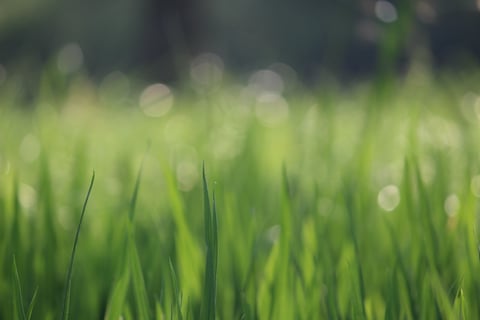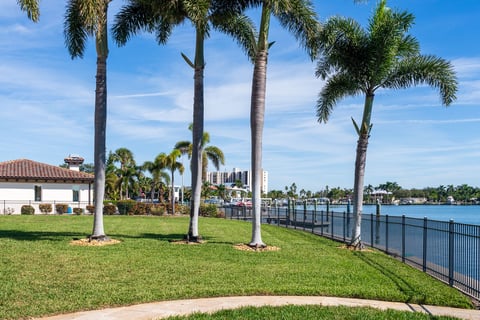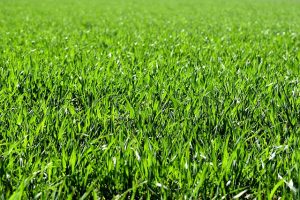


 Michael Tomaino
Michael Tomaino
That being said, we think it’s important to point out that a lot of traditional landscaping practices can be cruel and harsh on the environment. From chemicals in the ground water to fertilizer in our sewer systems to equipment wasting fossil fuels, landscaping can be an incredibly harsh thing for the environment.
Translation? This goes far past the health of your lawn.
Luckily, there are a few ways you can both keep your property happy and healthy while you’re doing as little damage to the environment as possible. Sustainability is a big deal, and not just for the green peace people. It’s a pertinent issue in the landscaping community and it’s something that all land, lawn, and garden owners should aim to stay up-to-date on.
Check out some of our sustainability practices for your commercial property and see how they can fit into your landscaping maintenance routine!
Did you know that you can do more with those recycled clippings? Think about when you cut your grass, spruce up your shrubs, or prune a tree or two – what do you end up doing with all that green waste? Do you haul it away? Wait for the trash collectors to pick it up? If so, that green waste (just chalk-full of nutrients and use) is sitting at some landfill just wasting away and decomposing. It’s time to stop letting all that potential to go to the dump!
Consider recycling your green waste! Take those shrub clippings, pruned limbs, perennial cuttings, and other green clippings and give them to us! We can work with you (and composting companies) to turn all of that excess material into rich, nutrient-happy compost, then, we’ll take the compost back and use it to enrich our clients’ gardens, lawns, and plant beds! Sounds like a happy recycling process, doesn’t it?
Consider how often you use herbicides to destroy the bane of all gardeners’ existence – weeds. Herbicides work great, don’t get us wrong, but it’s important to consider exactly what herbicides are – toxins that successfully kill weeds. We’re totally on board with herbicides, we use them in our landscaping practices, but it’s important to recognize the number of herbicides and the frequency in which we use them. If we can avoid using herbicides, we will, and one of the ways we do this is by cutting the grass higher.
We know, we know. You probably like your grass at that uniform 3-inches, and we get it, it looks good that way! But by cutting the grass just a touch higher, there’s room for shade to keep weeds from thriving. This will dramatically cut down on your need for herbicides.
More than that, it will cut down on your need to water, too. Longer blades of grass translate to longer grass roots, which will reach deeper into the soil for better water retention. Better water retention equals less watering (most of the time), cutting back on your energy bill and the amount of water you’re consuming specifically for your lawn!
If you’re considering investing in a mower, why not check out the electric power motors? Often, these motors work just a well as gas-powered motors, and they’re equipped with electric ignitions. What does that mean for the environment? An electric ignition doesn’t require fossil fuels (gasoline) to power it up and keep it working, which means that there will be few needs for fossil fuels for mowers, as well as a significant limit of the emissions that are entering the atmosphere.
Remember your dad’s old mower? It drank gasoline like water and coughed out black smoke whenever it tried to do its job? We live in a different world now and we need to consider the repercussions of the choices we make! Take a look at electric powered motors.
Handheld equipment is more than necessary for your landscaping needs – we can’t argue that. But have you considered the type of handheld equipment you’re using?
Odds are, your hedge clippers, tree trimmers, mowers, and mulchers are using up a ton of gas and oil to make them run – they probably run on two-stroke. The exhaust from this is incredibly dangerous for the environment because it creates a lot of pollution with elements like carbon monoxide, nitrous oxides, hydrocarbons, and more. Worse, they escape the machines in very large quantities.
Consider getting equipment with electrical ignitions and parts, or even consider compromising and going with a four-stroke engine. This means that half of the pollutants will be emitted into the atmosphere, saving your planet without sacrificing your landscape.
We know all about this in Florida, right?
Chances are, you’re relatively well-versed in the smart irrigation idea. As you know, careless irrigation wastes water, which does no one any good. Luckily, there are plenty environmental solutions for water wasting, including landscape irrigation technology. We can equip you with the latest and greatest irrigation systems, provide you with different methods (hint, for questions, ideas, and the benefits of both hand watering and smart irrigation, check out our blog post here).
Smart irrigation is a wonderful thing – you can purchase and install irrigation systems that are convenient, have timers, have self-cleaning features, and other smart irrigation controls. The idea behind these is that you’ll save water using these rather than just a blanket sprinkler system which could waste precious water resources.
We always apply by fertilization restrictions, and if you’re fertilizing on your own, you should, too! We suggest you always abide by the careful considerations for fertilizer – aka, the amount applied, the timing of the fertilizer, and where you’re allowed to apply it!
We suggest always going for a soil test, too, so you can guarantee you’re only applying the amount and type of fertilizer necessary for your yard – in other words, you don’t want to accidentally overdo it.
Don’t fertilize when you know there’s a storm or a ton of rain coming your way – it’s more than likely all that fertilizer will get washed off the grass and head straight for the storm drain or nearest fresh water source, polluting the water in the process.
Did you enjoy our sustainability article? We sure hope so! Feel free to check out our other articles on our blog here, or, give us a call to chat with us directly! We’re always happy to lend an ear (or a landscaping crew)! Give our office a call at (727)-201-3947. We can’t wait to hear from you!







Head Gardener for Landcrafters, Inc. Michael Tomaino, a cornerstone of Landcrafters since its inception, oversees all aspects of business operations with a wealth of experience. With years of adept team management and leadership under his belt, coupled with a robust educational background, both within and beyond the industry, Michael is dedicated to steering Landcrafters towards becoming the foremost landscape management provider in the Tampa Bay Area.